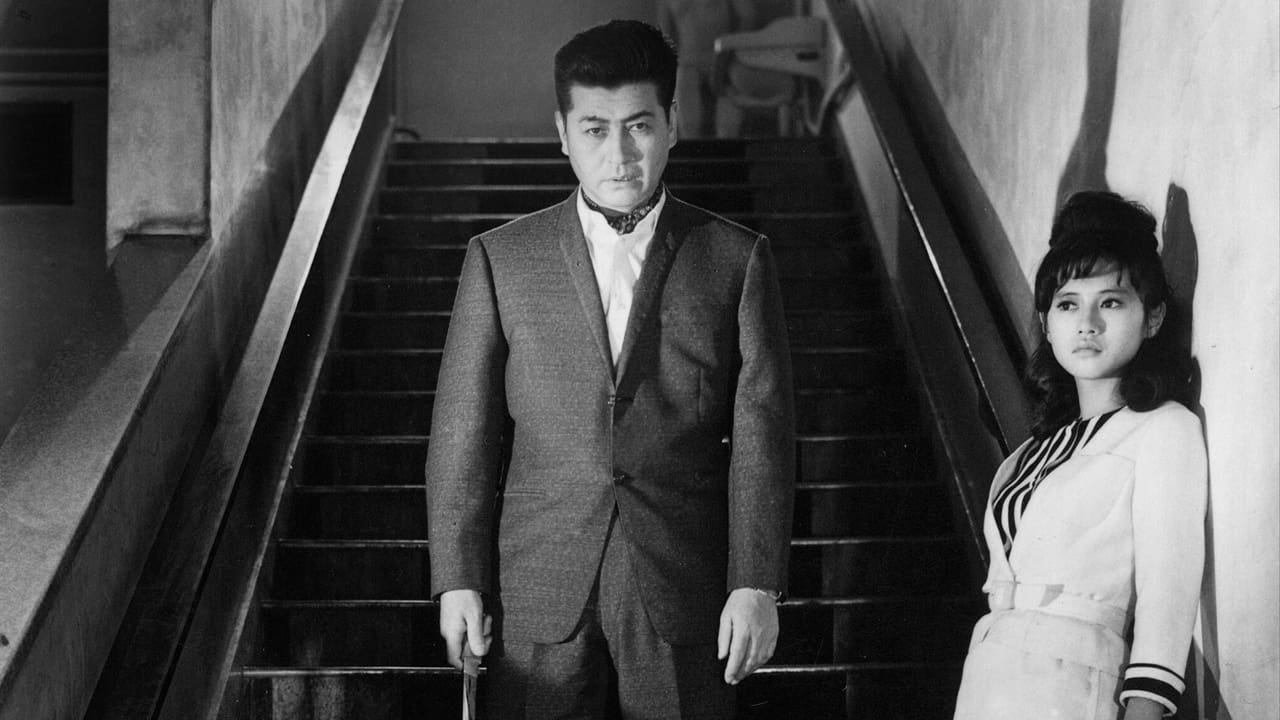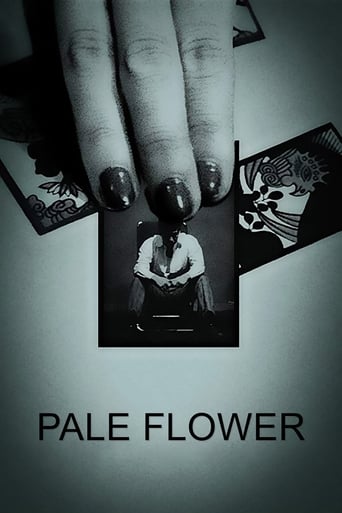

"Pale Flower" is directed by Masahiro Shinoda, and stars Ryo Ikebe as a slick yakuza recently released from a prison stint for murder. He meets Saeko (Mariko Kaga), a young women who seeks thrill and excitement. The two fall for each other, and navigate the dark nights of Tokyo looking for big gambling and excitement.This was a very stylish yakuza film-noir. It has colour and flare in droves, and is well shot and directed. The film oozes charm, as the two brave gambling dens, yakuza fronts and race along Tokyo highways at 2am. It is a story about two individuals who share the same disassociation with society, and feel nothing about life. They struggle to find meaning and enjoyment during the day, but fill their nights with sex, gambling, crime and drugs in order to make it. I really loved this movie. It kept me gripped for most of the film, even though little in the way of action occurs. This film instead keeps you focused on Muraki and Saeko as they struggle through the underworld together.I loved this film and highly recommend it. 9/10
... View MoreYakuza, Muraki is released from prison after three years for stabbing and killing a member of a rival gang. He is shocked to find out that his bosses have since amalgamated with the rival gang to fight off the advances of another gang from Osaka which is muscling in on their patch. Muraki is addicted to gambling and soon finds himself back in illegal gambling dens, where he meets with the alluring and seemingly very rich Saeko, a young woman who is addicted to living fast and seeking new thrills to keep her entertained. Through his contacts he introduces her to bigger games where the crime bosses play for much bigger stakes. Shinoda was part of the "New Wave" of Japanese film-makers that were frowned upon in many circles, not least by the Shochiko studio, generally a family orientated studio made famous by Ozu. To make matters worse the author Masaru Baba was less than impressed by the directors visual flair, (a flair that has been compared to that of Jean Pierre Melville and the French New Wave). He believed the visuals clouded his story, as a result the film was banned in Japan due to its over elaborations on illegal gambling. This quickly led Shinoda to the opinion that making films independently was the only way to go in the future, as even Tôru Takemitsu's superb score was frowned upon in Japan. Shinoda's visuals are exceptional and evoke memories of Noir Classics of the past, with all the staples catered for, rain drenched neon lit streets, chiaroscuro lighting, jaunty camera angles, our hero, cigarette on his lip wandering through the night with his lady of dubious past and intentions. As Muraki's affections grow for his new found platonic playmate, it would also seem to mirror the demise of his affections for all things Yakuza, he is a world weary man, an intelligent man, certainly more so than anyone in his own circles, he realises his own merits and deficiencies and comes to the conclusion he could have done better with life. Even Muraki's long time girlfriend who loves him dearly, wants to move on, Muraki is powerless to hold on to her as his infatuation grows, to the point where he is having lucid nightmares concerning Saeko. Pale Flower is not all doom and gloom though, there are respites of wryly dark humour, usually found in the mundane day to day workings of the Yakuza. Pale Flower is an astonishingly rich and layered character study that will keep even those with an aversion to subtitles entertained.
... View MoreMost of the Asian gangster movies I have seen, promote the brotherhood and the comradery between members, like Young and Dangerous, or have denounced gangster activity, showing if as degrading and evil. This movie does neither. It instead shows how gangster life has both good and bad; however in the end proves to be a pointless cause. The main character, is just released from jail, and immediately reunites with his own yakuza. His life is changed when he meets Saeko, a young woman who is addicted to high stakes life of the yakuza. Together they journey through a city and time, where everything is changing constantly; yet in the end, it becomes apparent that none of these things really matter. This movie is really good. I recommend it.
... View MoreWhereas "Blue Velvet" is about the lengths that people go to for sexual gratification, "Pale Flower" is about that lengths that people go to for a few "kicks," kind of like a Japanese gangster adaptation of Kerouac's "On the Road."Upon attempting to release "Pale Flower," the studio's censor banned the film, and this fact says quite a bit about the temperature of Post-War Japan's pop culture, and the target audience of this film. While the director claims the film is about Japan's uncertain stance in the Cold War, it may be more accurate to say that the film is about Shinoda's Nihilistic stance towards Japan's relationship to the world's superpowers. And while nihilism describes Shinoda, existentialism may better describe Muraki and Saeko. Gambling, animalistic sex, drugs, all in an effort to just feel something, anything, and to get lost in the moments those emotions provide. Some would say that the gambling scenes are too long and do little to advance the plot, but this movie's script is made up mostly of unspoken dialogue and it is during the gambling scenes that the main characters are developed.While I loved 95 percent of this film's moody and atmospheric lighting, at times it's so dark you can't tell what's going on. Still, the shots are well constructed, the actors well directed, and their performances subtle yet effective. Dig the sexual tension that is constantly building between Muraki and Saeko, and how this tension is dealt with. Somehow I felt myself sympathizing with this killer in a very real way, and this says something about Shinoda's and "Pale Flowers" success.
... View More